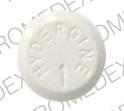Hydergine Disease Interactions
There are 2 disease interactions with Hydergine (ergoloid mesylates).
Amine ergots (applies to Hydergine) cardiovascular adverse effects
Major Potential Hazard, Moderate plausibility. Applicable conditions: Tachyarrhythmia
The amine ergot alkaloids, ergonovine and methylergonovine, can cause serious cardiovascular complications because of their vasospastic effects. Hypertension (more often with ergonovine) has been most commonly reported, particularly when administered IV undiluted or at an excessive rate or when used in conjunction with regional anesthesia or vasoconstrictors. Headaches, seizures, cerebrovascular accidents and death have been associated with the hypertensive episodes. Other, less common adverse effects include acute myocardial infarction, transient chest pains, thrombophlebitis, tachycardia and palpitations. Therapy with ergot alkaloids should generally be avoided, except under special circumstances, in patients with chronic hypertension, preeclampsia or eclampsia, cardiovascular disease, cerebrovascular disease, or peripheral vascular disease. Caution is advised when these agents are administered to patients with venoatrial shunts, mitral valve stenosis, or sepsis. Close monitoring of cardiovascular status is highly recommended during therapy.
Ergoloid mesylates (applies to Hydergine) psychosis
Major Potential Hazard, Moderate plausibility.
The use of ergoloid mesylates is contraindicated in patients with acute or chronic psychosis, regardless of etiology.
Switch to professional interaction data
Hydergine drug interactions
There are 6 drug interactions with Hydergine (ergoloid mesylates).
More about Hydergine (ergoloid mesylates)
- Hydergine consumer information
- Check interactions
- Compare alternatives
- Drug images
- Side effects
- Dosage information
- During pregnancy
- Drug class: miscellaneous central nervous system agents
Related treatment guides
Drug Interaction Classification
| Highly clinically significant. Avoid combinations; the risk of the interaction outweighs the benefit. | |
| Moderately clinically significant. Usually avoid combinations; use it only under special circumstances. | |
| Minimally clinically significant. Minimize risk; assess risk and consider an alternative drug, take steps to circumvent the interaction risk and/or institute a monitoring plan. | |
| No interaction information available. |
See also:
Further information
Always consult your healthcare provider to ensure the information displayed on this page applies to your personal circumstances.


